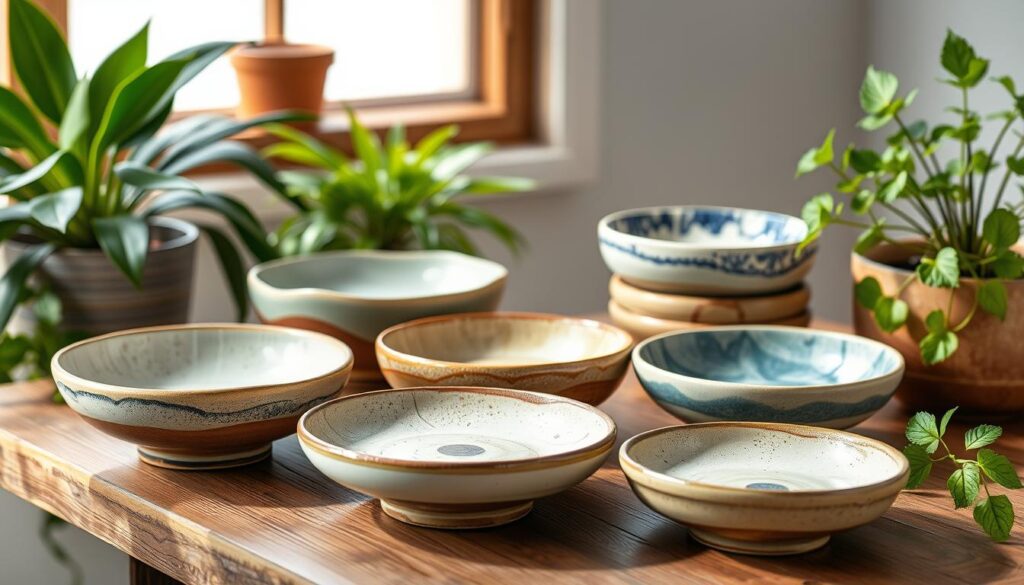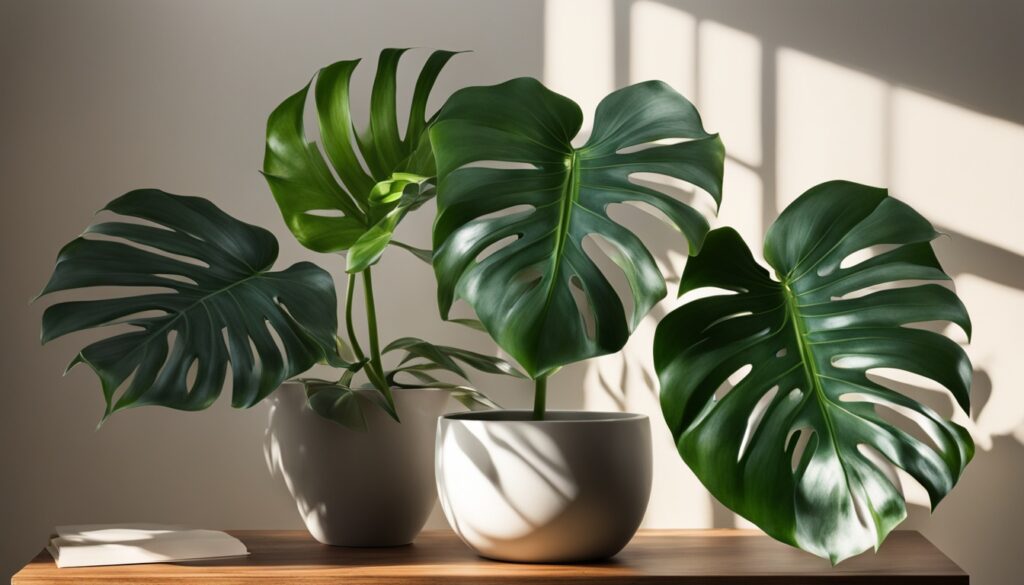Is your indoor plant mess making a mess on your floors or furniture? The simple solution might be ceramic plant saucers. But are they really worth it? Let’s explore the real value they can add to your indoor gardening.
Ceramic plant saucers are key for anyone who loves plants indoors. They protect surfaces from water damage and make your plants look better. Made from durable ceramic, they last longer than plastic or metal, making them a smart choice for your plants.
Key Takeaways
- Ceramic plant saucers provide effective drainage and protection against water damage.
- They offer a wide range of stylish designs to complement any indoor decor.
- Ceramic saucers are highly durable and resistant to cracking, chipping, or fading over time.
- These versatile trays can be used with a variety of plant types, from succulents to tropical plants.
- Proper saucer selection and maintenance can ensure the longevity of your indoor plants.
Understanding Plant Saucer Essentials
When you care for your potted plants, terracotta plant dishes and glazed saucer trays are key. They help keep your garden healthy and beautiful. These accessories come in many materials, sizes, and designs. Each one has its own benefits for your plants.
Types of Plant Saucers Available
Plant saucers are made from ceramic, clay, plastic, and even cork. Each material has its own advantages. For example, terracotta plant dishes look classic, while cork mats are waterproof. Clear saucers are eco-friendly, and deep clear saucers help with watering.
Basic Functions and Benefits
A plant saucer’s main job is to catch water that drains from the pot. This stops water from damaging your floor or furniture. It also keeps your plants healthy by giving them the right moisture. Plus, saucers can make your plants look better, matching your pots and decor.
Size and Compatibility Guidelines
Choosing the right plant saucer is important. It should fit your pot well to catch water. Clear heavy-duty saucers protect floors under big planters. Hanging saucers collect water for outdoor plants in hot weather.
Knowing about plant saucers helps you pick the best one for your plants. This choice will match your plants’ needs and your space’s look.
The Importance of Proper Drainage Solutions
Keeping plants healthy starts with good drainage. Snake plants need soil that drains well and dries fast. Using the right drainage plate liners and garden supplies is key.
Grower pots have holes at the bottom to let water out. This helps prevent root rot. Succulents need about an inch of water a month, while foliage plants should be watered when the soil feels dry.
It’s important to let water drain through the holes when watering. Most plants need a way to release water, especially in wet areas.
Choosing potting mix over regular soil helps with drainage. It contains materials like coconut coir and perlite that let water flow and support healthy roots.
| Material | Drainage Hole Requirements |
|---|---|
| Wood, clay, and terracotta pots | Typically only need one drainage hole |
| Glazed terracotta, fiberglass, plastic, glass, and metal containers | Require three or more holes for larger pots to allow water to escape adequately |
Succulents are very sensitive to wet soil, which can rot them. But, plants like Cordyline and Pothos can do well in moist conditions without drainage.
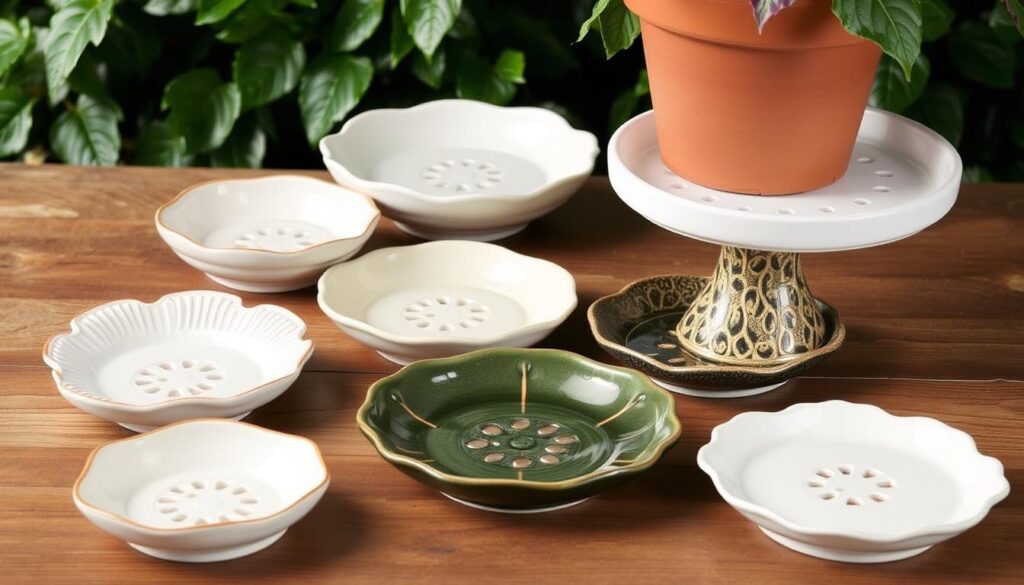
Ceramic Plant Saucers: Features and Benefits
Ceramic plant saucers are key for protecting your plants and keeping them healthy. They are durable and look great, making them a must-have for plant care.
Durability and Longevity
Ceramic plant saucers are known for lasting a long time. They are made from top-quality materials. This means they can protect your plants for years, both inside and outside.
They won’t fade, crack, or chip easily. So, they stay looking good for a long time.
Aesthetic Appeal and Design Options
Ceramic plant saucers come in many designs, colors, and finishes. This makes it easy to find the right one for your decorative pot underlays. You can choose from modern to traditional styles. They fit well with your home decor, making your plants look even better.
Material Quality Considerations
When picking ceramic plant saucers, check the materials. Look for ones that are UV-resistant and frost-proof. This means they can handle outdoor weather and stay looking good.
Also, check the craftsmanship. Good workmanship means your saucers will last longer and work better.
“The ceramic plant saucers I purchased have been a game-changer for my indoor plants. They’re not only visually stunning, but they’ve also helped prevent water damage and root rot, keeping my plants thriving and healthy.”
Terracotta and Clay Saucer Alternatives
Looking for something natural and earthy? Terracotta plant dishes and clay flower pot saucers are great choices. They drain well, perfect for plants that like dry soil. These saucers bring a rustic feel to any space, indoors or outdoors.
But, terracotta and clay saucers might break more easily than ceramic ones. They need a little extra care to stay looking good. Make sure to dry them well and avoid sudden temperature changes to keep them going.
| Feature | Terracotta Saucers | Ceramic Saucers |
|---|---|---|
| Material | Baked clay | Glazed ceramic |
| Durability | Prone to cracking and chipping | Highly durable and long-lasting |
| Drainage | Excellent drainage due to porous nature | Moderate drainage, can be enhanced with drainage holes |
| Aesthetic | Rustic, earthy appearance | Wide range of design options and finishes |
| Maintenance | Requires careful handling and cleaning | Generally easier to maintain and clean |
Thinking about terracotta plant dishes or clay flower pot saucers? Think about what your plant needs and what you like. With the right care, these natural options can enhance any plant display.
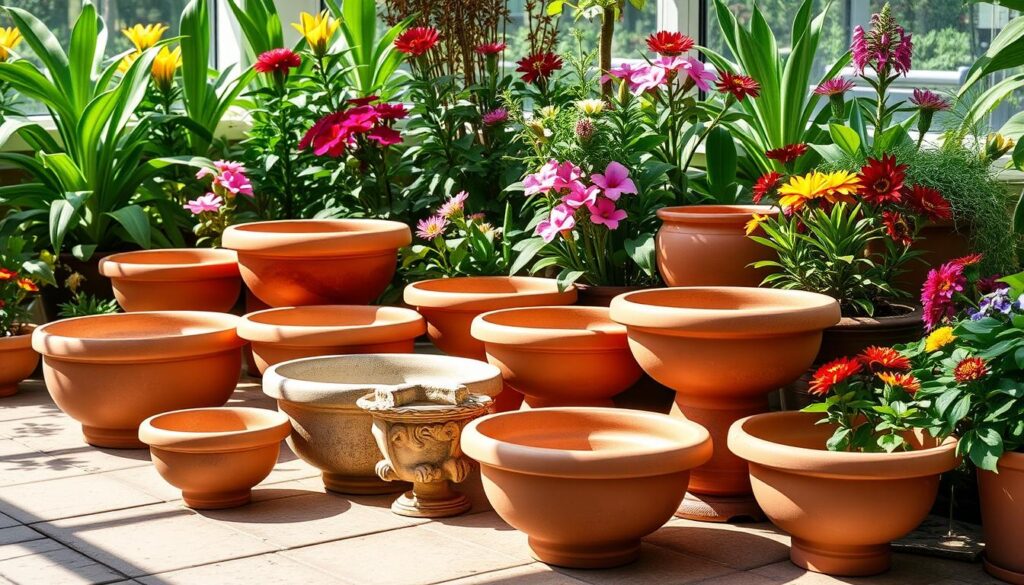
Choosing the Right Size for Your Pots
When picking the perfect bonsai pot saucers or succulent planter dishes, size is key. The right size saucer helps with drainage and keeps water in, keeping your plants healthy.
Measuring Guidelines
To find the best saucer size, measure your pot’s diameter first. The saucer should be 1-2 inches wider than the pot’s rim. This extra space helps with water overflow and prevents spills. Also, make sure the saucer’s depth can hold enough water to moisten the soil in your pot.
Common Size Standards
While there’s no strict rule, some standards are common. For instance, a 6-inch pot fits well with an 8-inch saucer. A 10-inch pot might need a 12-inch saucer. Always check the measurements before buying to get a perfect match.
| Pot Size | Saucer Size |
|---|---|
| 6 inches | 8 inches |
| 8 inches | 10 inches |
| 10 inches | 12 inches |
| 12 inches | 14 inches |
Finding the right balance between pot and saucer is crucial for plant care. By following these tips, you can make sure your plants get the right amount of water and drainage they need to grow well.
“Ridiculously small saucers on hanging baskets make watering difficult, necessitating soaking the pots in the sink.”
Indoor vs Outdoor Saucer Applications
Choosing the right plant saucers depends on where you plan to use them. Indoor gardening accessories and garden pottery supplies have different uses. They meet different needs.
Indoor saucers focus on looks and protecting your floors. They come in many designs, textures, and colors. Outdoor saucers, however, need to be tough and weather-proof. They must support your plants well.
Think about UV resistance, frost tolerance, and drainage when picking saucers. Indoor saucers might look better, but outdoor ones must be practical. They need to keep your plants and outdoor areas safe.
- Transparent plastic saucers let you check water levels easily. They help prevent plants from getting too wet, which is good for their health.
- Designer-compliant saucers, like terra cotta or ceramic, can make your indoor spaces look elegant. But, they might stain surfaces if not cared for properly.
- Rigid plastic saucers are easy to clean and affordable. They are often dishwasher-safe, making them a low-maintenance choice.
Whether you’re growing plants indoors or outdoors, the right saucer is key. It helps keep your plants healthy and looking great.
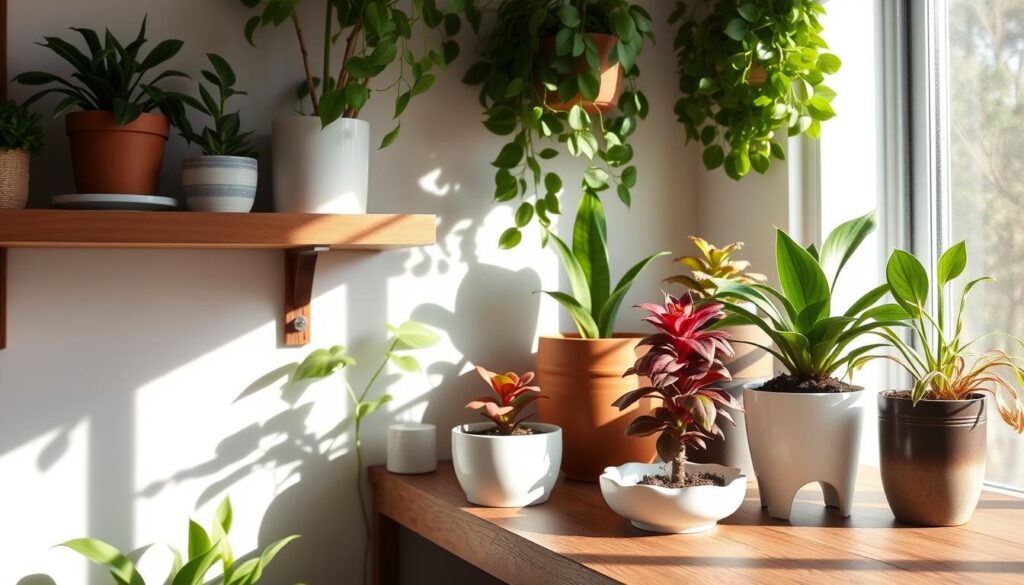
Decorative Styles and Design Elements
Ceramic plant saucers come in many styles, from sleek to ornate. You can find one that matches your plant and home decor. Whether you like modern or classic, there’s a saucer for you.
Contemporary Designs
For a modern look, choose contemporary ceramic plant saucers with simple designs. These glazed saucer trays fit well with modern homes. They add a stylish touch to your plants.
Traditional Patterns
For a timeless look, go for traditional ceramic plant saucers with detailed designs. These decorative pot underlays have floral patterns or textures. They’re perfect for traditional or farmhouse styles.
“The vessel in which plants are placed is equally significant for their aesthetics. Design-centric containers like antique urns or reclaimed primitive wood vessels are suggested for enhanced plant display.”
Think about how the saucer will look with your plant and decor. The right plant saucer can make your plants stand out. It creates a beautiful scene in your home.
Maintenance and Care Tips
Keeping your ceramic plant saucers looking good and working well is key. Regular cleaning and care keep them in top shape. This stops problems like mineral buildup or mold.
To clean your saucers, mix mild soap with water. Stay away from harsh chemicals or rough cleaners that can harm the glaze. Use a soft brush to wipe away dirt, minerals, or plant matter. Then, rinse well and let them dry before putting them back under your plants.
Check your saucers often for cracks, chips, or wear. If you find damage, replace them right away. This keeps them catching water and protecting your surfaces. Choosing durable saucers means you won’t need to replace them as often.
“Proper maintenance ensures the longevity of your ceramic plant saucers, preserving their functionality and aesthetic appeal for years to come.”
By taking care of your ceramic plant saucers, you get to enjoy their beauty and benefits. They provide elegant design, reliable drainage, and protect your garden pottery supplies.
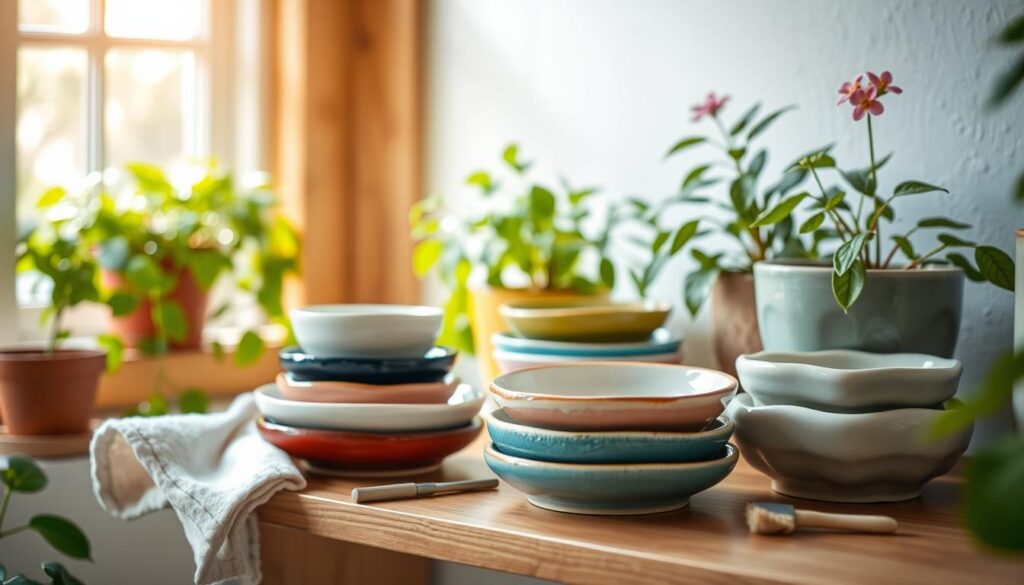
Price Ranges and Value Considerations
Ceramic plant saucers come in many prices to fit different budgets. You can find affordable options or high-end ones with special features. It’s key to think about what you get for your money when buying a ceramic plant saucer.
Budget-Friendly Options
If you want to spend less, there are many affordable ceramic plant saucers. These options are good for keeping your floors dry and looking nice with your plants. They might not last as long or look as fancy as the more expensive ones, but they’re a smart choice for saving money.
Premium Selections
Premium ceramic plant saucers are a big step up in quality and style. They’re made with better materials, so they last longer. Plus, they have fancy designs that make your plants look even better indoors or outdoors.
When looking at prices, think about the material, design, and brand. Cheaper saucers might do the job, but the fancy ones offer more value. They last longer and make your plants look amazing.
Surface Protection Strategies
Protecting your surfaces from water damage is key in indoor gardening. Drainage plate liners and indoor gardening accessories help prevent scratches, stains, and more. They keep your floors and furniture safe.
Using felt or rubber pads under your plant saucers is a smart move. These pads cushion the saucer, avoiding damage to your surfaces. Adding waterproof mats or trays under the saucers catches any extra water or moisture.
- Felt or rubber pads under saucers to prevent scratches
- Waterproof mats or trays to catch excess water and condensation
These strategies help you enjoy your indoor plants without worrying about damage. With a bit of preparation, your indoor garden will stay clean and organized. It will also enhance your home’s look.
“Protecting your surfaces is just as important as caring for your plants. Invest in the right accessories to ensure a hassle-free indoor gardening experience.”

Seasonal Care and Storage
As the seasons change, it’s key to adjust your care for your ceramic plant saucers. In colder months, move outdoor garden pottery supplies like ceramic plant saucers inside. This protects them from frost and freezing, preventing damage from water expansion.
Before storing your ceramic plant saucers for winter, clean and dry them well. Moisture can cause mold and mildew, harming your garden pottery supplies. Stack them carefully, adding a protective layer between each to avoid chipping or cracking.
By following these tips, your ceramic plant saucers will last longer. They’ll be ready for use when the weather warms up. Proper care keeps your plants healthy and your garden pottery supplies in great shape.
| Material | Recommended Storage | Lifespan |
|---|---|---|
| Plastic Pots | Stored in a dry, dark place away from direct sunlight | Can degrade in 1 season or last over 5 years |
| Fabric Grow Bags | Stored empty in a dark and dry place | Can be reused for multiple seasons |
| Terracotta/Clay Pots | Stored outside in a dry place to allow drying before cleaning | Can last for many years with proper care |
| Plastic Nursery Liners | Stored for repotting plants in decorative containers | Can be reused for multiple seasons |
By following these storage tips for your garden pottery supplies, including ceramic plant saucers, they’ll stay in great shape. They’ll be ready for use season after season.
Matching Saucers with Plant Types
Choosing the right saucers for your indoor plants is key. Different plants need specific saucers to grow well. Let’s look at what succulents and tropical plants need, and how to pick the best ceramic plant saucers for them.
Succulent Requirements
Succulents like shallow succulent planter dishes for good drainage. Ceramic saucers with low profiles and lots of holes help prevent water from staying too long. This stops root rot and keeps these plants healthy.
The ceramic saucers also let moisture evaporate. This makes a perfect spot for succulents to grow.
Tropical Plant Needs
Tropical plants do well in deeper orchid pot bases. These saucers hold water, which then evaporates and makes the air around the plant more humid. This is great for plants that love moist soil and high humidity.
Choosing the right saucers for your plants makes them grow better. It also makes your indoor garden look better.

| Plant Type | Saucer Requirement | Saucer Depth | Drainage |
|---|---|---|---|
| Succulents | Shallow succulent planter dishes | Low profile | Ample drainage holes |
| Tropical Plants | Deeper orchid pot bases | Increased depth | Allows for water accumulation |
Conclusion
Ceramic plant saucers are perfect for both indoor and outdoor gardening. They offer great drainage and protect surfaces. This makes your plants healthier and look better.
These saucers come in many designs, from modern to traditional. They fit well with different decor styles. This makes your living or outdoor spaces look better.
When starting your indoor gardening or improving your outdoor space, think about ceramic plant saucers. Choose ones that fit your space and plants well. This way, you can make a beautiful setting that shows off your style.
Adding ceramic plant saucers to your gardening can make a big difference. They improve drainage and protect surfaces. Plus, they add elegance to your space.
So, let ceramic plant saucers be a key part of your gardening. They make your space look good and work well. Enjoy the benefits of better drainage and protection, along with style.
